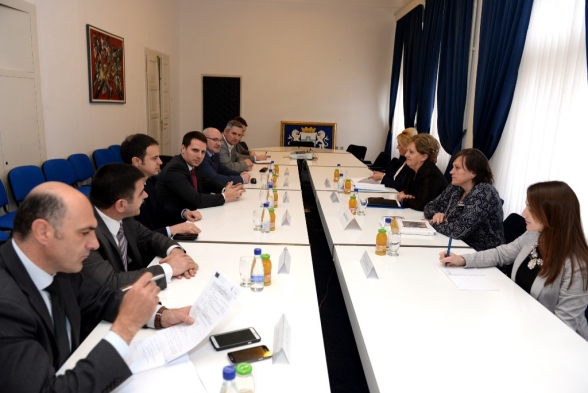Within the activities aimed at promotion of the European integration process among youth, the Committee on European Integration today held four debates with students of grammar schools, namely: “Niko Rolović“ – Bar, “Petar I Petrović Njegoš“ – Danilovgrad, “Slobodan Škerović“ – Podgorica, and “Bratstvo i jedinstvo“ – Ulcinj. Additionally, the Committee members met representatives of the said municipalities.
Today’s debates were focused on the importance of youth’s role regarding the European integration process and dynamics of implementation of reforms in society. MPs spoke on the manner of functioning of the European Union, different segments of the negotiation course, but also on concrete steps necessary for fulfilling requests. They emphasised that this process should be followed by the commitment of all citizens to adoption of new standards but also acceptance of civilizational values of the Union.
Presenting the benefits which young people may have in this phase of integration, MPs particularly stresses Erasmus+, new programme for education, training, youth and sports, for which 14.7 billion euros have been allocated for the period 2014-2020. The Programme comprises seven programmes of the previous financial perspective and it provides possibilities for studying, training, youth policies and sports.
Making debates very constructive and inspirational, the participants were interested for employment and studying abroad, possibility for improving the status of seamen, and protection of domestic production. There were concrete comments on the topic of sea contamination and prevention of poaching, fight against corruption and nepotism in the society, as well as on the topic of economic and security perspectives. The participants were interested in motives of the EU for initiating negotiations with Montenegro on the membership, and how Montenegro may contribute to the EU development.
The meetings with leadership of municipalities were marked by the exchange of opinions on possibilities for deepening cooperation at the state and local level, as well as discussion on implemented projects, with the emphasis on the IPA programme. It was emphasised that Montenegro has been offered, within IPA II programme, a total of 270 million euros, and that it was the most important for usage of the said funds to provide creative ideas and administrative and technical staff capable to write and implement the project. They emphasised projects such as inter-municipality project of energy efficiency of five costal municipalities and Cetinje, projects for forbidding pouching in Ulcinj, the project of building women’s pavilion for rehabilitation of psychoactive substances on Kakaricka gora, reconstruction of the Centre of Culture Danilovgrad and introduction of the heating and cooling system by using geothermal energy as well as cooperation of four municipalities on the territory of Sinjajevina.
As the most significant problem that the municipalities have been facing with, they emphasised the lack of means for pre-funding and co-funding of projects, which presented the pre-conditions for using funds from the Union. In addition to addressing that issue, the general impression of all meetings held is the existence of the need for building new and improving the existing staff, but also the stronger inter-municipality cooperation aimed at using the funds at the best possible manner.
On behalf of the Committee on European Committee, Committee Chairperson Mr Slaven Radunović and members of the Committee Mr Genci Nimanbegu and Mr Srđa Popović took part in activities in Ulcinj and Bar, while Deputy Chairperson Ms Marija Maja Ćatović and members of the Committee Mr Koča Pavlović and Ms Azra Jasavić participated in activities in Danilovgrad and Podgorica.









